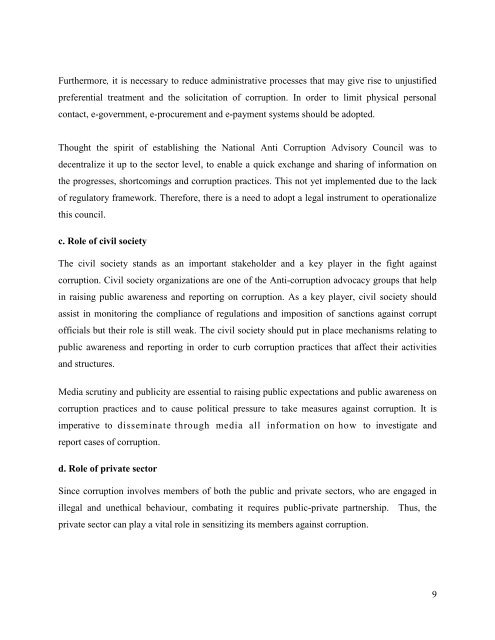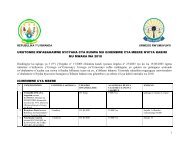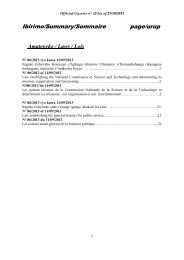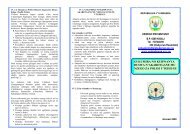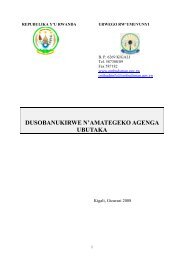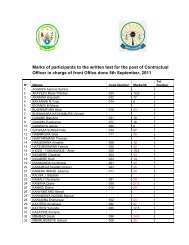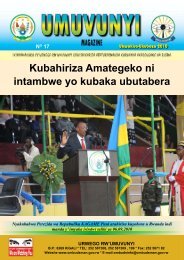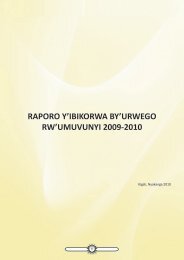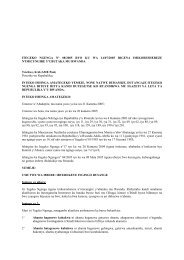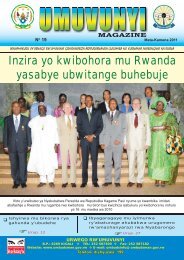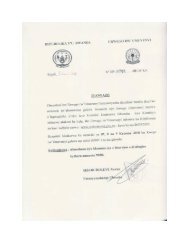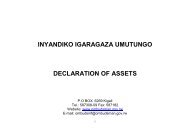RWANDA ANTI-CORRUPTION POLICY - Office of the Ombudsman
RWANDA ANTI-CORRUPTION POLICY - Office of the Ombudsman
RWANDA ANTI-CORRUPTION POLICY - Office of the Ombudsman
Create successful ePaper yourself
Turn your PDF publications into a flip-book with our unique Google optimized e-Paper software.
Fur<strong>the</strong>rmore, it is necessary to reduce administrative processes that may give rise to unjustified<br />
preferential treatment and <strong>the</strong> solicitation <strong>of</strong> corruption. In order to limit physical personal<br />
contact, e-government, e-procurement and e-payment systems should be adopted.<br />
Thought <strong>the</strong> spirit <strong>of</strong> establishing <strong>the</strong> National Anti Corruption Advisory Council was to<br />
decentralize it up to <strong>the</strong> sector level, to enable a quick exchange and sharing <strong>of</strong> information on<br />
<strong>the</strong> progresses, shortcomings and corruption practices. This not yet implemented due to <strong>the</strong> lack<br />
<strong>of</strong> regulatory framework. Therefore, <strong>the</strong>re is a need to adopt a legal instrument to operationalize<br />
this council.<br />
c. Role <strong>of</strong> civil society<br />
The civil society stands as an important stakeholder and a key player in <strong>the</strong> fight against<br />
corruption. Civil society organizations are one <strong>of</strong> <strong>the</strong> Anti-corruption advocacy groups that help<br />
in raising public awareness and reporting on corruption. As a key player, civil society should<br />
assist in monitoring <strong>the</strong> compliance <strong>of</strong> regulations and imposition <strong>of</strong> sanctions against corrupt<br />
<strong>of</strong>ficials but <strong>the</strong>ir role is still weak. The civil society should put in place mechanisms relating to<br />
public awareness and reporting in order to curb corruption practices that affect <strong>the</strong>ir activities<br />
and structures.<br />
Media scrutiny and publicity are essential to raising public expectations and public awareness on<br />
corruption practices and to cause political pressure to take measures against corruption. It is<br />
imperative to disseminate through media all information on how to investigate and<br />
report cases <strong>of</strong> corruption.<br />
d. Role <strong>of</strong> private sector<br />
Since corruption involves members <strong>of</strong> both <strong>the</strong> public and private sectors, who are engaged in<br />
illegal and unethical behaviour, combating it requires public-private partnership. Thus, <strong>the</strong><br />
private sector can play a vital role in sensitizing its members against corruption.<br />
9


